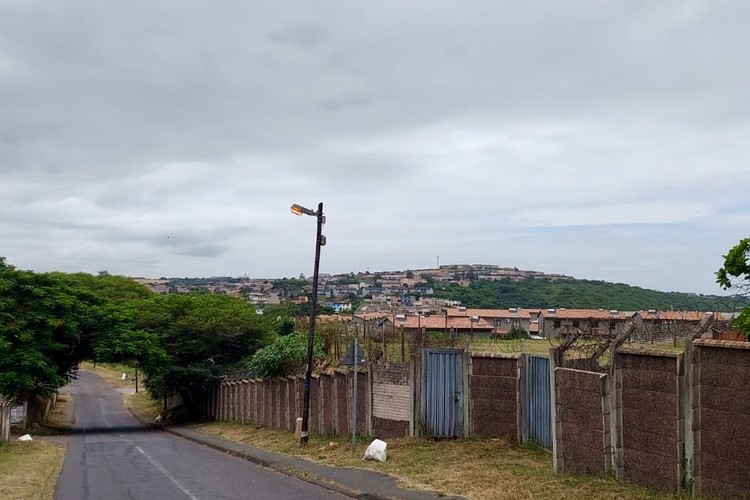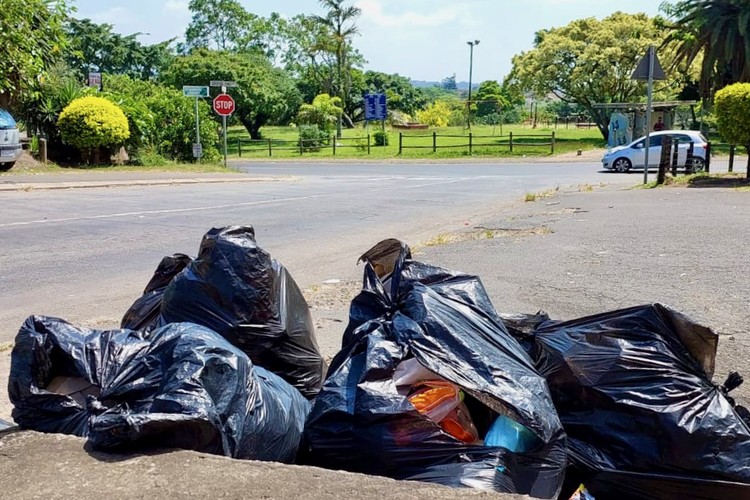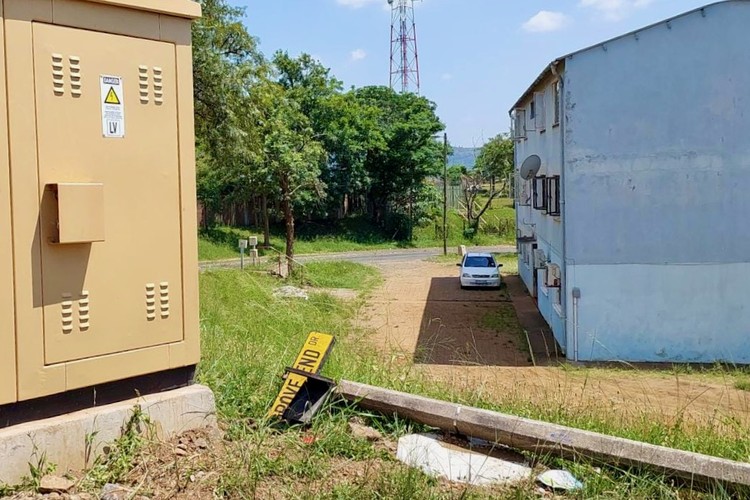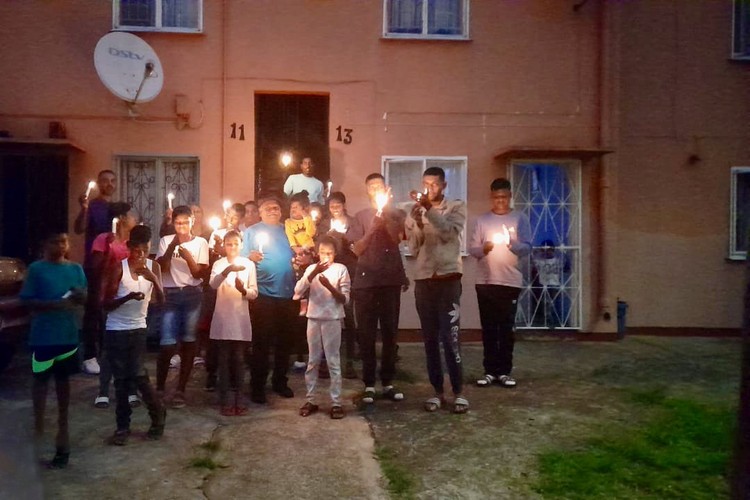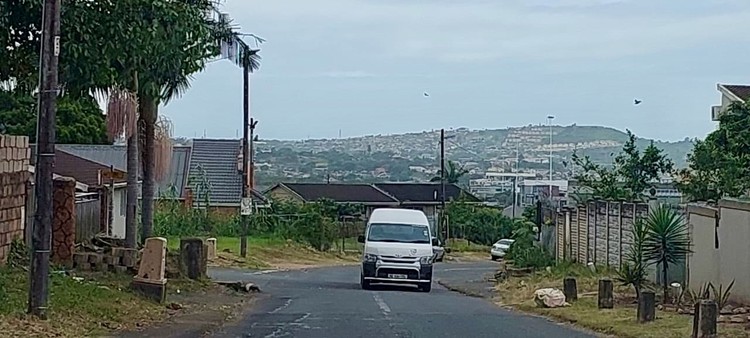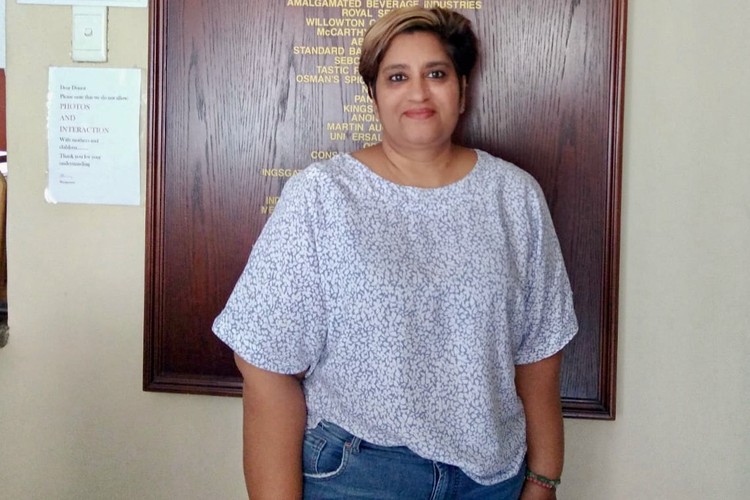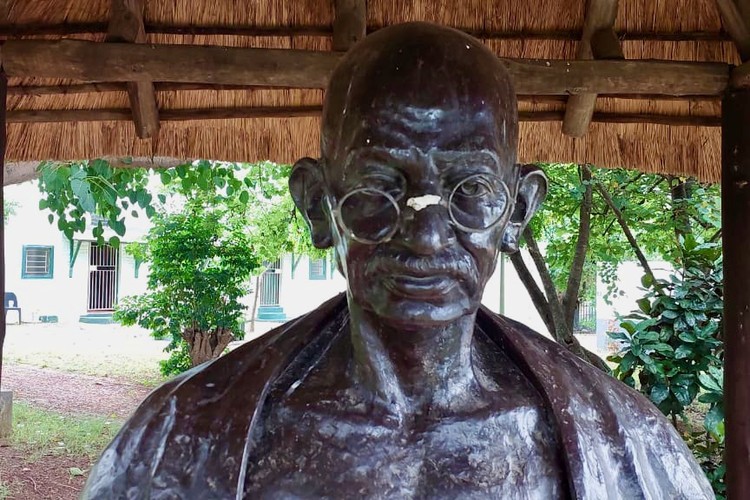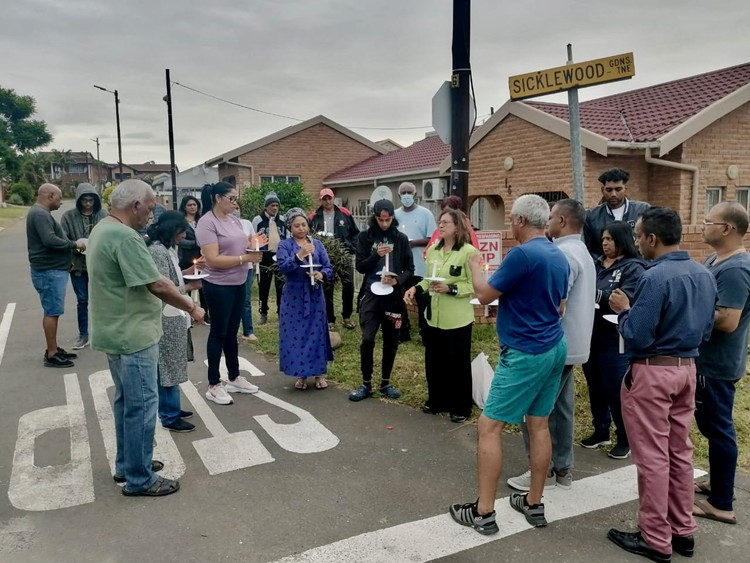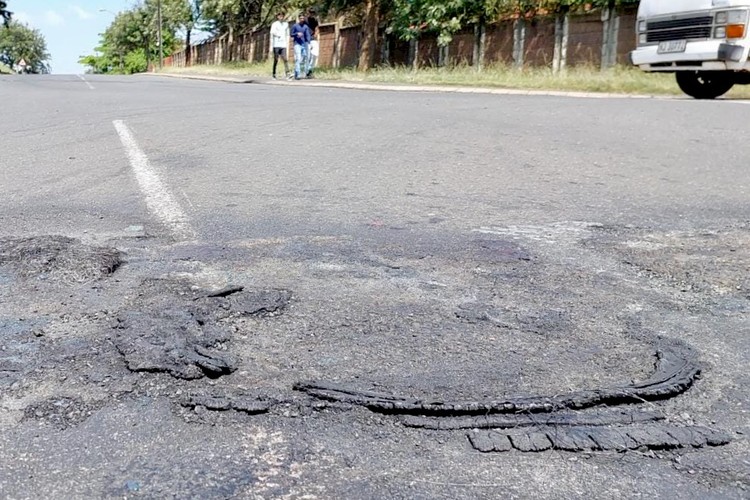Phoenix still unsettled by 2021 unrest
Collapsing basic services are crippling the town’s attempts to rebuild community
Phoenix is a densely populated town in the north of Durban. The community has been up in arms over failing basic services. Photo: Benita Enoch
- Residents of Phoenix in KwaZulu-Natal say garbage goes uncollected, water is rationed, and power outages additional to loadshedding are common.
- People are divided on how to respond to failing basic services, with some favouring violent protests and others seeing this as making things worse.
- Phoenix suffers numerous social ills and there is a lack of state facilities such as shelters, rehab centres, an old age home or sport facilities for the youth.
- A legacy of racial tensions and violence continues to haunt the town.
Phoenix, north of Durban, was hit by a heatwave in January, and while temperatures outside soared, tempers within the community flared up too. On private messaging apps and social media, residents called for protests against the collapse of basic services in the town.
A 40-hour power outage during the sweltering heat was the final straw and sparked violence. About 80 residents resorted to blocking the R102 Highway at Grove End on 16 January – a desperate attempt to get the eThekwini Municipality to respond to their plight. But Mayor Mxolisi Kaunda never pitched up.
Over the course of four days, tyres were burned, street poles toppled and signs ripped down, and power lines chopped to pieces.
When the protests petered out, people lambasted each other on social media groups for not heeding the call to join and sustain the protest action.
Nearly every community leader GroundUp spoke to in the past weeks, including ward councillors and aid organisations, said Phoenix is suffering a crisis of factionalism and faltering social cohesion.
Phoenix came under national scrutiny during the July 2021 unrest in KwaZulu-Natal when vigilantism was blamed for the deaths of 36 people.
In the months that followed, the EFF led marches that some felt stirred up racial tensions. Various community organisations tried their best to unite the community.
But acrimony persists between different sectors of the population. People in formal houses direct their anger at people in neighbouring informal settlements, accusing them of cable theft and seeing them as a drain on rate-paying residents.
In the sweltering heat, uncollected rubbish lies piled up on residential roads, the stench filtering into homes. Residents say ward councillors have told them to put their rubbish outside on the curb, in case rubbish trucks arrive unannounced. Photo: Benita Enoch
Split by protests
Four days after the most recent protests, heaps of black bin bags lined Grove End, uncollected for over two weeks and stinking in the heat. The protests had produced no improvement in services.
Some residents GroundUp spoke to condoned the recent protests, including the destruction of public property, saying it is the only way to send a message to an unresponsive government.
Others condemned the protests, saying residents will have to live with the infrastructure they destroyed, which will only exacerbate their difficulties.
In Grove End, the site of recent protests, this street pole was pushed over. Alongside, outside the picture, is a chopped-up wooden electricity pole. Photo: Benita Enoch
“We were a community of people who ‘made a plan’ to get our homes and streets looking nice,” says community activist Kumarie Govender. “Now, we’re seeing a trend of residents … misdirecting their anger at others and destroying a Phoenix that future generations have to inhabit after them.”
“We are battling loadshedding, aged infrastructure that breaks frequently, resulting in prolonged power outages; we are rationed with water, and we have no bin collection services,” she said.
Phoenix residents hold a candlelight vigil on 29 January. Photo: Giving Hope Foundation
Activist Johnny Reddy organised a peaceful “candle light protest” on 29 January in which hundreds of people participated at various locations, he said. He said it was intended as a symbolic response to the power outages and a message of hope, that if the community rallies together it can solve the town’s problems independently of the municipality.
“It’s our grandkids and their children who will have to live with the actions we are taking today,” said Reddy. “And the worst part is that we won’t even be here to help them if they suffer from what we did or did not do to help this community.”
Reddy proposes an urban improvement project, funded by voluntary donations to pursue communal alternative energy supply and refuse services.
People in uMhlanga and Durban North are already doing this, although those residents have more disposable income than families in Phoenix. The average annual household income in Phoenix is R57,300. Phoenix has a 56% unemployment rate.
Reddy admits the project will be difficult to get off the ground. Also, many residents say they pay their rates and expect to receive the services for which they have already paid.
Yet three independent sources told GroundUp that Phoenix residents owe the municipality millions in unpaid rates. GroundUp was not able to confirm this with the eThekwini municipality.
Last year, the municipality took action against people who had accounts more than 120 days in arrears. A number of schools also had their power cut off for failing to pay their municipal bills.
Concerns are mounting that an increasing population in Phoenix is placing strain on failing service infrastructure. Photo: Benita Enoch
Crime
Phoenix police station did not respond to our queries about crime and policing capacity. But according to SAPS statistics online, there were 43 and 41 murders in the 2020 and 2021 financial years respectively, and 79 in the year counting the unrest months. There are similar distortions that year in figures for other crimes, with 2,415 contact crimes recorded.
Former chairperson of the Community Policing Forum Umesh Singh said theft was a daily occurrence in Phoenix. He said drug addiction fuels many opportunistic theft incidents.
Kumarie Govender says Phoenix is no longer a safe place for women to walk alone. She said even in broad daylight women are mugged, their cellphones and wallets taken.
“They even take their thalis [a gold necklace worn by married Hindu women],” she said.
Councillor Jonathan Annipen (IFP) says the Phoenix police station is understaffed and underskilled. He said police are not trusted.
Nadia Munsamy says Sahara Shelter is nearly always fully occupied and victims usually come with just the clothes on their back. Photo: Benita Enoch
Social ills
Like many places in South Africa, Phoenix suffers the social scourges of domestic violence, drug and alcohol abuse. Yet there are no state-owned rehabilitation centres, no shelters for victims of domestic violence, and no municipal home for the elderly in Phoenix. There are also no sports facilities for young people.
All the organisations GroundUp spoke to working in these sectors were non-profit companies relying on private funding.
We found one alcohol rehab centre with a six-month waiting list for voluntary admission.
On Monday, a newborn baby was found abandoned in a plastic bag outside a residential complex in Sunford. A resident, who spoke to us on condition of anonymity, said the baby was heard crying during the night. The police are investigating the case and looking for the parents.
Nadia Munsamy, KwaZulu-Natal chair of the National Shelter Movement of South Africa, who also acts as the public relations officer for Phoenix Child Welfare, said, “In a year we might see around five abandonments – sometimes more, sometimes less.”
Phoenix Child Welfare had set up a baby dropbox for distressed parents but it was very rarely used. “We find that there are cameras from surrounding neighbours which might identify the parents and this acts as a deterrent,” she said.
Munsamy said the 22 rooms at the Sahara Shelter, which houses people fleeing domestic violence, are nearly always full.
She said the domestic violence was driven by poverty, drug and alcohol addiction. “Abusers suffer emotional and psychological breakdowns because of financial pressures [and] … take out their feelings on their families,” said Munsamy.
Munsamy said the Department of Social Development contributed R70 per person per day to the shelter, but it required the shelter to provide victims with five meals per day. “So, for example, we are obliged to provide breakfast, a 10am snack, lunch, a 2pm snack and dinner at 6pm. Over and above that we must serve main courses with side salads which drives up the costs of running the facility,” said Munsamy.
She said the shelter’s electricity bill was R18,000 per month. On top of that is rent, food, toiletries, clean clothes for the residents, furniture, bedding, and staff and administrative costs.
“Many of the victims of violence flee their homes with absolutely nothing. We might find that their abusers have torn up their ID documents or burned their belongings. They flee with their children and whatever they are wearing,” she said.
A bust of Mahatma Gandhi with broken glasses overlooks the house where he used to live. Photo: Benita Enoch
Racial tensions
Phoenix has a history of Indian and Black African conflict, going back to violence that swept the area in 1949 and 1986, as well as the July 2021 unrest. Of the 36 people who died in the most recent conflict, three were Indian, the rest African. The 2021 unrest has cemented Phoenix’s bad reputation for race relations.
When GroundUp chatted to residents, thinly veiled racist comments about an African government sidelining Indians often surfaced.
Narendh Ganesh, chairperson of the Duffs Road Civic Associations, where a home was torched during the July unrest, says he is in the process of forming a new party to unite everyone – the National Independent Congress of South Africa or NICSA, the same acronym as the Natal Indian Congress founded in Phoenix by Mahatma Gandhi in 1894 to fight discrimination against Indians. Ganesh says the choice of name is coincidental.
“The councillors need to start working. They need to start engaging with the community,” he said.
But, says Ganesh, many councillors are “very afraid of the community”.
Ganesh called out the municipal heads of the departments of water, sanitation, electricity, parks and gardens, saying they should be visiting the area and engaging with the community. He said the recent protests erupted because the community felt unheard.
He said unless there was urgent change, “when the cauldron bursts, I think we are all going to pay a price for it. We shouldn’t get to that stage”.
Another candlelight vigil on 29 January. Photo: Giving Hope Foundation
Community activist Zinzi Nyuswa from Bhambayi, a neighbouring informal settlement, told GroundUp that while she had encountered racist rhetoric from some Phoenix residents, not all residents thought that way. She said every community in South Africa held racist beliefs.
“We have racism in our own community, too. We must not turn to pointing fingers because it will only further divide us,” she said.
“Here in Bhambayi we know that we don’t pay rates, but we also know that somebody is paying for us to have access to running water and electricity. We know that our people are sometimes stealing cables and these acts are in all communities. There are some people in Phoenix also stealing electricity. But, we must not be distracted by the crimes by assigning it to race.”
Nyuswa said the wounds of historical clashes between Indians and Africans were in urgent need of healing.
“What we are finding is that we still carry those wounds in asking other communities, ‘Where were you when my father was killed?’ But they will not have the answers because they were not the perpetrators. And we are painting an entire community with the same brush.
“A few residents of Phoenix have come over to Bhambayi and Ezimangweni and a few of our people have gone over to Phoenix. There is kindness on both sides,” said Nyuswa.
She said she was open to working with activists from Phoenix to unpack the factors that caused the 36 July deaths. But she said politicians would probably try to hijack the process and the public should not allow themselves to be polarised.
“This government is trying to keep us divided in order to keep us from working together and voting them out. We must not be fooled into playing their game,” she said.
Nyuswa said ANC-led wards do not get better service delivery. “We still don’t have services. We cannot even get information. Our ANC councillors have failed us repeatedly,” she said.
In the 2021 local government elections the DA retained Phoenix with an outright majority in all the wards, although support was down from 2016. The rest of the votes are spread across various other parties, with none of them having significant support ahead of others.
The DA, Action SA and the IFP condemned the destruction of property during the recent protests.
eThekwini Municipality, the Department of Social Development, and the Phoenix police station did not respond to our emails and phone calls.
Road damage caused by tyres burnt by protesters. Photo: Benita Enoch
© 2023 GroundUp. This article is licensed under a Creative Commons Attribution-NoDerivatives 4.0 International License.
You may republish this article, so long as you credit the authors and GroundUp, and do not change the text. Please include a link back to the original article.
We put an invisible pixel in the article so that we can count traffic to republishers. All analytics tools are solely on our servers. We do not give our logs to any third party. Logs are deleted after two weeks. We do not use any IP address identifying information except to count regional traffic. We are solely interested in counting hits, not tracking users. If you republish, please do not delete the invisible pixel.

